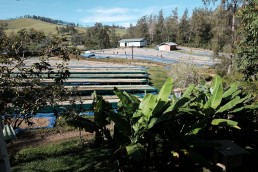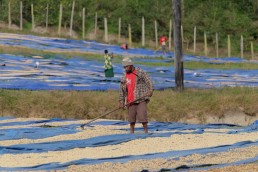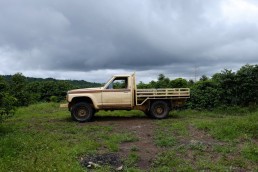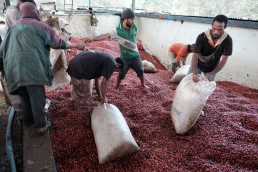as our first coffee offering from PNG, we couldn’t be happier to feature not one but THREE coffees from Baroida Estate. rarely does the exact same coffee get processed 3 different ways & each wind up tasting amazing. plus, we think it’s a really great way to understand the effects processing can have on the end result.
origin: aiyura, kianantu, eastern highlands
produced by: colbran family – baroida estate
processing method: honey, washed, natural
varietal: arusha, bourbon, mundo novo, typica
elevation: 1700-1850m above sea level


Baroida Estate is located in the Kainantu District, Eastern Highlands Province and was founded by Ben Colbran in the 1960’s when the Government encouraged foreign agriculturalists to begin cultivating land throughout the highlands. after purchasing the land Ben was amongst the first farmers to cultivate coffee in these valleys. the farm was around 600 acres but due to the cost involved in purchasing the estate he needed to begin making money as soon as possible, so he started out with vegetables, like broccoli & cabbage, as well as strawberries & other fruits.
these crops flourished in the highlands and were much sought after in the port city’s markets. with the money he earned, he would buy goods like sugar, tea & flour that were much harder to get in the highlands. in doing this, Ben slowly saved enough money to set up a sawmill, which he saw as a better means of generating funds for his new coffee farm – which had been the dream all along! Today, Ben’s son Nicol runs the plantation.
the Baroida plantation sits at the apex of the Lamari river valley and Mount Jabarra range. the plantation itself sits at about 1,691 meters above sea level amongst thousands of hectares of cleared land with former colonial coffee estates surrounding them (now run by native landowners) and flanked by mountains filled with small holder coffee producers who cultivate close to a million trees.


one of the biggest challenges that the Colbran’s faced when they first started out was the issue of soil water-logging. the system widely used for planting coffee seedlings in Papua New Guinea was adapted from Kenya. this method was completely unsuitable for the wet highlands of PNG, where the average annual rainfall is 90 inches (as opposed to Kenya’s <60 inches). this issue was solved by digging drainage ditches in between each row of coffee. after a short time Ben became very good at ‘reading’ the coffee to see what it needed (i.e. certain fertilizers or whether the coffee was diseased) and more shade trees were planted in order to reduce requirements for fertilizer as well as keep weeds under control.
we were lucky enough to buy the same coffee from Baroida Estate, processed three different ways!
natural: involves fermenting & drying the cherry whole. drying requires careful monitoring & attention to ensure the coffee dries evenly. natural coffees are typically sweeter and fruitier. tastes like: sour cherry, pomegranate & milk choc.
washed: all the pulp & mucilage of the coffee is removed before it’s washed and dried. this particular lot was fermented for 36 hours. washed coffees tend to be more floral and acidic. tastes like: apple, apricot & sugar cane.
honey: some of the mucilage is removed before drying. even drying is more difficult as it becomes sticky & harder to turn. honey processed coffees are somewhere between washed & natural. tastes like: toffee, red grape & plum.
we’re currently running the washed as an espresso & the natural will soon hit the rotation as a filter. for the coffee lovers, we’ve also put together a filter tasting flight for you to try all three, side by side…hit the store now for more!
